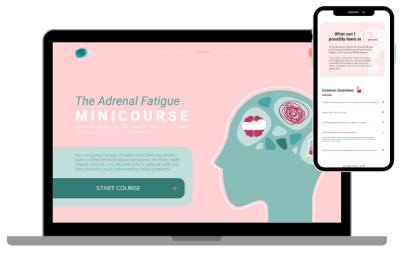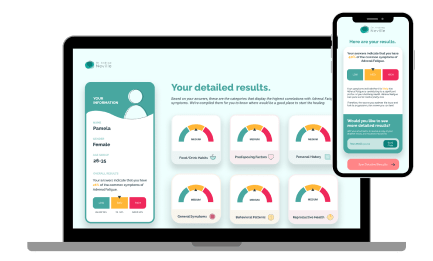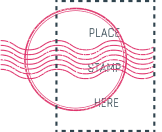Adrenal Fatigue creates the perfect environment for the development of food allergies and sensitivities. Adrenal Fatigue, aka Stress Response Dysfunction (SRD), may not be the only cause of food allergies, but it is certainly a major player.
Contrary to what many people believe, food allergies or sensitivities are not what cause the symptoms of Adrenal Fatigue, such as congestion, headache, and fatigue; it’s the other way around. Adrenal Fatigue is the culprit, and food allergies are the result.
As I help patients heal the root cause of food allergies, I also address them with direct treatment before they become a bigger stressor on the body. I do this by using food sensitivity testing, food elimination and challenges, and perhaps by adding natural antihistamines.
Calming those allergies lets us focus on the underlying cause: the immune and digestive dysfunction associated with the Adrenal Fatigue.
The Vicious Cycle of Food Allergies and Sensitivities
People with a Stress Response Dysfunction (aka Adrenal Fatigue) are especially at risk for developing food allergies and sensitivities. Adrenal Fatigue suppresses the immune system as well as the digestive system.
Since organs of those systems are strong and in balance during times of rest (“rest-and-digest,” the opposite of “fight-or-flight), it makes sense that a constant stress response would set them out of whack.
Adrenal Fatigue creates the perfect environment for developing food allergies.
This shift in the immune system leads to increased immune system sampling, which leads to an increased potential for mistakes and an increased tendency for antibody production. When this general increase occurs, the antibody production to anything may increase, including gluten, dairy, and even environmental allergies.
Once we develop a food allergy, every time we eat it is an added stressor taxing our stress response system. It’s a vicious cycle. We must identify and treat the food allergies while healing the underlying cause of why the food allergies occurred in the first place!
Suppressed Digestion and Food Intolerance
Suppressed digestion from chronic stress and Adrenal Fatigue leads to low stomach acid production, which leaves undigested food in the stomach. This undigested food is then dumped into the small intestine where it causes irritation to the sensitive digestive lining.
These undigested foods will also appear foreign to the immune system. That means that they’re more likely to be “sampled” by the immune system. This sampling process leads to the increased likelihood of “mistakes,” where undesirable antibodies to the food are produced.
Every time we eat an allergic food, it slows our healing.
This process is made even worse by the irritation in the lining of the digestive tract that is created by the undigested food. Stress hormones also deteriorate the protective outer mucin lining in the digestive tract.
This vulnerable environment creates damage and inflammation that leads to intestinal permeability or “leaky gut.” Leaky gut acts just like it sounds; the lining of the gut becomes permeable to larger bits of protein allowing them to enter the bloodstream.
Once these proteins enter the bloodstream, they are even more likely to be identified as foreign by the immune system, leading to further immune sampling and increased antibody production.
Learn what’s really going on with your body and why you’re still experiencing symptoms…despite all your attempts to get better.
Learn what’s really going on with your body and why you’re still experiencing symptoms…despite all your attempts to get better.
Other Symptoms of Food Allergy and Sensitivity
More subtle types of food reactions often do not cause any digestive symptoms at all. While this is rather counter-intuitive, it has repeatedly proven to be true in practice.
The following delayed-onset food reactions take longer, sometimes days, to develop and generate more systemic symptoms than digestive symptoms. This delay makes them much more difficult to identify without sensitive testing.
Some symptoms that can develop from these types of reactions include
- Fatigue
- Congestion
- Ear infection
- Headache
- Heartburn
- Eczema
- Asthma
- Joint pain
- Heart palpitations
- High blood pressure
Why You Didn’t Test “Positive” Through Your Allergist
Antibodies to foods and the environment are typically found in the IgE, IgG, or IgA subclasses. Traditional allergists only test for the most severe of allergic reactions, which is an IgE-mediated reaction. But what if you’re reacting to a different class of antibody, like IgG or IgA? You’re not going to test “positive” for allergies.
Anaphylactic reactions account for a small percentage of the total number of adverse reactions to food that exist. Looking more deeply into the immune system will yield signs of subtle food allergies and sensitivities that plague those with Adrenal Fatigue. These are usually IgG or IgA reactions.
Headaches, asthma, joint pain, and congestion are all signs of food allergies.
The majority of allergists do not feel that reactions on an IgG or IgA level are clinically significant. This means, to them, these reactions do not cause enough disease to warrant assessment and treatment.
The Best Allergy Testing for Adrenal Fatigue Patients
In my clinical experience, however, many patients get symptomatic relief from the treatment of IgG-mediated food sensitivities. IgG is associated with the blood and is often tested to identify delayed or “hidden” food allergies or sensitivities.
If I suspect possible food allergies or sensitivities, I test IgG ELISA first. Then, while we’re healing the underlying cause of these allergies, we also treat the symptoms in the digestive and immune systems.
When the symptoms of these allergies are relieved, it also alleviates a major disease stressor on the stress response system. Lifting that burden enables them to heal on a deeper level faster than if these reactions went untested and untreated.
Tips for Success When Eliminating Allergic Foods
- Concentrate on enjoying the foods you can eat rather than lamenting the ones you can’t.
- Focus on meats, fish, veggies, and fruits, and minimal starches like rice, corn, and potato.
- Simplify your meals. You do not have to be a professional chef to manage this diet.
- Be cautious with gluten-free (GF) options since they are going to be all carb. Most of us know that carbs are converted to sugar easily.
- Follow a hypoglycemic diet and control blood sugar.
- Throw out the idea of breakfast, lunch, and dinner. Enjoy three meals a day in whatever order you prefer. Consider eating traditional breakfast foods at dinner, and vice versa.
How to Be Rid of Food Allergies for Good
Stress response dysfunction (SRD), aka Adrenal Fatigue, forms the physiological state that creates food allergies. The over-activated stress response system is “telling” the digestive and immune systems to behave this way.
Treatment of symptoms involves a combination of elimination and avoidance. Targeting healing of the gut and immune system is also necessary. But these steps are in addition to quieting and healing the Adrenal Fatigue. It is only as this occurs that any effort to target digestive mucosal healing and balancing the immune system can be effective long-term.
Once we uncover any hidden food allergies, we begin with gentle, temporary, and progressive elimination, avoidance, or restriction of foods that cause the sensitivities. So they don’t get discouraged, I tell my patients that, although it’s temporary, it is a long temporary.
Typically, the avoidance period lasts 6-12 months. During this time, I encourage them to explore options that keep as much variety in their diet as possible.
Because Adrenal Fatigue and SRD are at the root of food allergies (and food allergies exacerbate Adrenal Fatigue), attention to the entire stress response system is essential for healing.





















